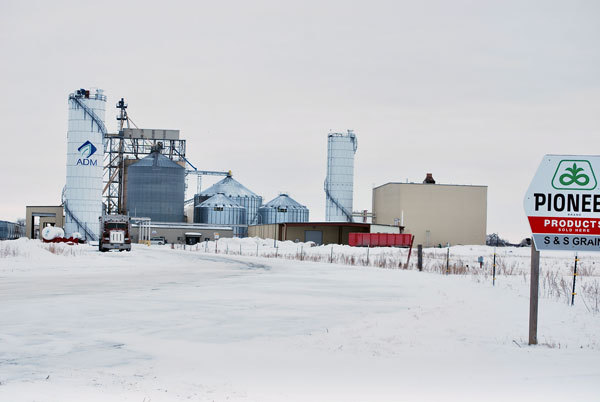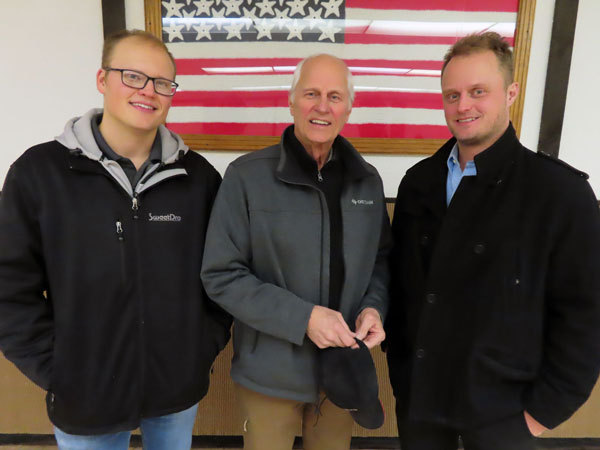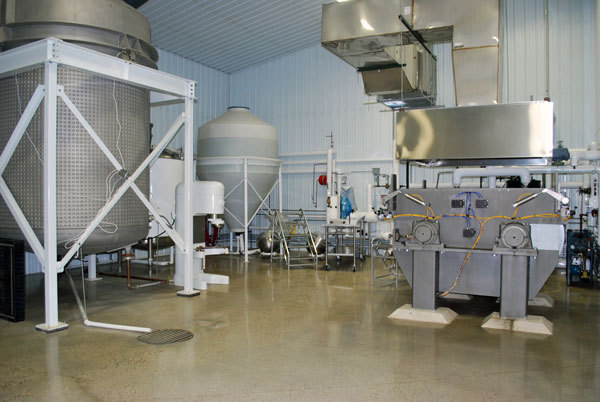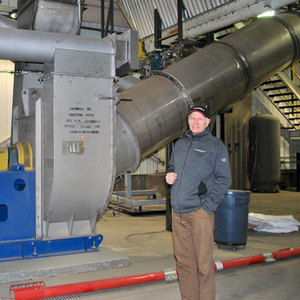Business of Good Health





PHOTO: SUE RETKA SCHILL
March 15, 2022
BY Susanne Retka Schill
Bob Thornberg turns the ethanol business case on its head. When fermenting grains to make ProBiotein, he’s not using corn and he’s not interested in making ethanol. Acetic and lactic acid bacteria aren’t contaminants. And low and slow is the norm.
Thornberg is known in the ethanol industry for making SweetPro lick tubs, combining DDGS and condensed distillers solids (CDS) with minerals, vitamins and SweetPro’s “special sauce”—ProBiotein. A decade ago, Thornberg added food-grade production of ProBiotein. And this winter, the final stages in repurposing part of a long-shuttered ethanol plant will boost feed grade ProBiotein production and facilitate new feed lines aimed at non-ruminants. Gross sales tally around $14 million annually, supporting 36 employees in the company’s North Dakota and Kansas locations.
Thornberg’s slow and steady trajectory has shown that flipping the model works—decisions made after experiencing the struggles and failures of the early ethanol industry.
In the mid-1980s, Thornberg managed the 10 MMgy ethanol plant in Walhalla, North Dakota. Built by a group of local investors, Dawn Enterprises set out to use surplus barley grown in the region. However, the plant struggled to reach capacity, primarily due to a bottleneck at the centrifuges. It also struggled to move its barley distillers that were even less understood than corn distillers. Thornberg arrived shortly after the plant’s startup and led the switch from barley. “We ended up going to corn to maximize ethanol production,” he says. “With the higher fat, better lubricity of corn, the plant ran much better. And there was better awareness of the distillers.”
Though running far better, commodity price swings—oil prices plunging from $35 to $9 a barrel just as corn prices rose—hurt the struggling young company. “Revenue going down and cost going up is like a scissors that cuts you off at the knees,” Thornberg says. “I saw the inevitability of it periodically cycling through like that, and I didn’t want to be on that roller coaster.” He figured the feed side would be a safer bet, with feed prices following corn. And, while he enthusiastically supported ethanol’s energy independence message in those early days, as he does today, he worried that the attacks on ethanol would succeed and the government mandates would disappear. “I wanted to be able to live without them.”
Thornberg also saw an opportunity. Much of the Walhalla DDGS were being shipped to Europe. And although U.S. dairies and feedlots were discovering their usefulness, there were very few such customers in northeastern North Dakota. Thornberg wanted to find a way to feed DDGS to cattle on pasture.
The new owner of the plant, CHS, wasn’t interested, but didn’t object to Thornberg pursuing the idea. He left the ethanol plant and worked with researchers at North Dakota State University to develop lick tubs for pastured cattle, using DDGS and CDS for a protein boost and as a carrier for minerals and vitamins to supplement grass-fed cattle. In 1991, Thornberg launched Harvest Fuels Inc. to manufacture SweetPro lick tubs. That same year, Archer Daniels Midland bought the Walhalla plant and continued to supply DDGS and CDS for his project.
Focus on Feed
“We almost had to create a new industry of a molasses-free lick tub,” he says. “We had to develop all the equipment—we stomped the first barrels for the research work with our feet,” he recalls with a laugh. When sales began to grow, the Walhalla SweetPro plant, built in a former potato warehouse, was limited at 50 tons a day capacity. In 1996, Horton, Kansas, was chosen as the site for expansion, putting production closer to a bigger cattle market.
Thornberg credits the inventiveness of Lyle Edelman, whose son Ryan is now vice president of SweetPro operations in Kansas, for improving the process and equipment. “The first tubs we pressed and cured for two days,” Thornberg recalls. “That’s time intensive. And then we had to send guys in to scrape out the mixers. Now it’s all automated and we can fill a tub every 25 seconds. Kansas can do 200 tons a day.”
Today, SweetPro is distributed across the U.S., with much of Walhalla’s production bound for Canadian dealers. The technology is licensed to Arizona Grain, owners of ethanol producer Pinal Energy in Maricopa, Arizona. For several years, product also has been exported to Australia where MSM Milling has licensed the technology and has a plant under construction.
Developing DFM
The story of ProBiotein’s development mirrors SweetPro lick tubs’—a response to ethanol’s vulnerability in the early days. “The ethanol industry would periodically get shaky,” Thornberg recalls. “Once we began hitting our stride on the feed side, we worried what would happen if we couldn’t get distillers grains and solubles. Our initial look was what can we do to ferment and process our own raw material to make non molasses lick tubs.” Based in northeastern North Dakota and Kansas, that meant looking at small grains.
In 1998, Thornberg landed a Phase 1 Small Business Innovation Research grant to demonstrate the upgrading of wheat midds, a low-value byproduct of flour milling, from 18% protein to a 47% protein concentrate, in part through fermentation and the incorporation of yeast. A Phase 2 grant followed in 2000 to build a prototype plant in Walhalla.
As that work was being completed, the ethanol industry began to flourish, eliminating the concern about DDGS sourcing. Thornberg shifted the focus to producing a direct-fed microbial (DFM) feed. “DFM in the feed industry is more valuable,” he explains. “Distillers is a byproduct; dried at high temperatures; cooked at high temperatures; part of a heavy-duty process. It’s a great feed, don’t get me wrong. But we’re going at it from another perspective, where [DFM] is the primary product.”
ProBiotein is made through a fermentation process aimed at optimizing yeast production with cook and saccharification parameters kept as slow and gentle as possible to preserve enzymes and nutrients. The substrate mixture of wheat, flax, oats and barley broadens the amino acid profile of the fermented grains. Using malted barley adds enzymes, and flax adds omega 3 oils. Contributions from acetic and lactic acid bacteria are welcomed as added nutrients. Once fermentation ends, the beer is mixed with dry minerals and other ingredients to complete the feed supplement. There’s no beer well, no distillation, no centrifuges, and until recently, no dryers. What little alcohol is produced remains in the product.
Harvest Fuels began adding the trademarked ProBiotein to all its SweetPro feeds in 2004, both lick tubs and bagged supplements where the liquid ProBiotein is mixed with dried materials. The launch of ProBiotein also opened the door for feed supplements aimed at the horse market—SweetPro EquiPride and EquiLix.
The reception in the horse feed market was particularly good, Thornberg says, but one reaction prompted his next venture. “People were seeing stronger hooves, clearer eyes and improved coats on their horses. They began to wonder if it would be good for them, and they started eating it,” he recalls. “We said, ‘Don’t do that!’ … I was concerned. You could tell them all day not to, but if it’s working, they’ll keep doing it.”
Food not Feed
The food project started small, fermenting the same mixture of grains used in the feed version in a converted 300-gallon milk cooler in the kitchen of the former Dairy Queen in Walhalla. Seeing an opportunity, plans for a new building for feed production morphed into a food-grade facility.
The new venture, Food First LLC, began fermenting and drying ProBiotein for human consumption in 2012, packaged in 1-pound and 8-ounce containers. Food First also developed the MicroBiome Bar in four flavors, promoting them as a source of prebiotic fibers, omega-3 fatty acids, beta-glucans and fermented protein.
The ProBiotein.com website describes the product as a fermented functional food fiber made with organic wheat, oats, flax and barley malt. The fermentation process reduces the starches, concentrates the proteins and provides nutritional yeast, plus four prebiotic fibers, all of which support healthy gut function—where 70% of the immune system originates.
Thornberg says it feels like an uphill battle that’s a lot like the early days of promoting SweetPro. The challenge then was to convince cattle feeders that DDGS were better than molasses-based supplements. On the human consumption side, the challenge is to educate consumers about the benefits of prebiotics. “Dietary fiber and making your gut health and immune system stronger—that’s still really early,” Thornberg says. “People don’t understand.”
Back to the First
While the food side shows promise of becoming more profitable than feed, Thornberg adds the feed side still has upward potential. This time, an opportunity brought him full circle to the place he started out at in Walhalla.
The year Food First launched in 2012, ADM announced it was permanently closing the ethanol plant in Walhalla. Expanded to 30 MMgy by then, Thornberg considered buying the plant, but knew it was too old, too small and poorly situated to be successful.
Two years later, the facility was purchased and split four ways, with Thornberg acquiring the part he was most interested in. Salvager Dean Latozke arranged the deal and dismantled the ethanol plant. Walhalla Bean bought flat storage and land. Smith Farms got the grain handling and half the administration building to use for its seed business. Thornberg bought the other half of the admin building and adjacent warehouse, which included an attached gluten plant.
The warehouse capacity was quickly utilized and over the past decade as funds were available, portions of the gluten mill were put back in service. ADM had added gluten milling shortly after purchasing the plant, but mothballed it after only a few years. “I never knew if we were going to run into a ‘gotcha,’” Thornberg says about the equipment that sat for more than two decades. There was no guarantee that it could be put back into service economically. The electrical room was in good shape, but the natural gas panel had a leak that caused major corrosion and required refitting. Some of the bagging equipment was removed, and ducting redirected to the bagging segments that were kept.
The real prize, a ring dryer, was in surprisingly good shape. The dryer and bagging equipment were put into service first, with the liquid ProBiotein trucked over from the feed plant in town. The dryer quickly demonstrated its ability to maintain the valuable nutrients in the DFM through its low temperature drying capability.
The last steps were completed this winter. Two prop tanks acquired from the original ethanol plant were put back into service, one for cook and the other for saccharification. The added capacity and ability to dry 2,500 pounds per hour opens the way for SweetPro to enter into new markets in poultry and swine. “The completion of the gluten plant conversion for dry ProBiotein DFM puts us in a position to double current sales in the years ahead,” Thornberg says. “We’re just getting started.”
Slow but Satisfying
Sitting in the same office where he started out 35 years ago, Thornberg admits his business style reflects his fermentation approach—slow with conservative parameters. “As we paid down debt, we’d add new debt and new capability,” he says. “We made sure we could service debt even if the new enterprise failed. I’ve seen so many plants with processes that people got excited about, but they have to work exactly as projected or they die. It was a long trajectory and a risk-averse strategy on my part, but as we tried new things, if they didn’t work, I’d be able to live with the fact that they didn’t work. It’s not exciting for people who want rockets, but I’ll trade the potential for a big rocket for not having a big explosion,” he says with a laugh.
“The feed side has connected in a nice way,” he continues. “Our ability to create the SweetPro brand that’s now a nationwide brand and the EquiPride and EquiLix products that work better than anything else. I don’t say that because it’s our product, but they had to work better in order to compete in a big, mature industry. They had to [compete]. They did. And they do,” Thornberg says. “And that’s fun.
“There’s a satisfaction in that. Sometimes persistent little pikers can still play in the big arena. That’s been the juice for me, because the journey is not easy. But the journey is what it’s about.”
Author: Susanne Retka Schill
Contact: editor@bbiinternational.com
Advertisement
Advertisement
Advertisement
Advertisement
Related Stories
The Michigan Advanced Biofuels Coalition and Green Marine are partnering to accelerating adoption of sustainable biofuels to improve air quality and reduce GHG emissions in Michigan and across the Great Lakes and St. Lawrence Seaway.
EIA reduces production forecasts for biobased diesel, increases forecast for other fuels, including SAF
The U.S. Energy Information Administration reduced its 2025 forecasts for renewable diesel and biodiesel in its latest Short-Term Energy Outlook, released April 10. The outlook for “other biofuel” production, which includes SAF, was raised.
FutureFuel Corp. on March 26 announced the restart of its 59 MMgy biodiesel plant in Batesville, Arkansas. The company’s annual report, released April 4, indicates biodiesel production was down 24% last year when compared to 2023.
Neste has started producing SAF at its renewable products refinery in Rotterdam. The refinery has been modified to enable Neste to produce up to 500,000 tons of SAF per year. Neste’s global SAF production capacity is now 1.5 million tons.
Tidewater expects to make final investment decision on proposed SAF project during second half of 2025
Tidewater Renewables Ltd. has reported that its biorefinery in Prince George, British Columbia, operated at 88% capacity last year. A final investment decision on the company’s proposed SAF project is expected by year end.
Upcoming Events










